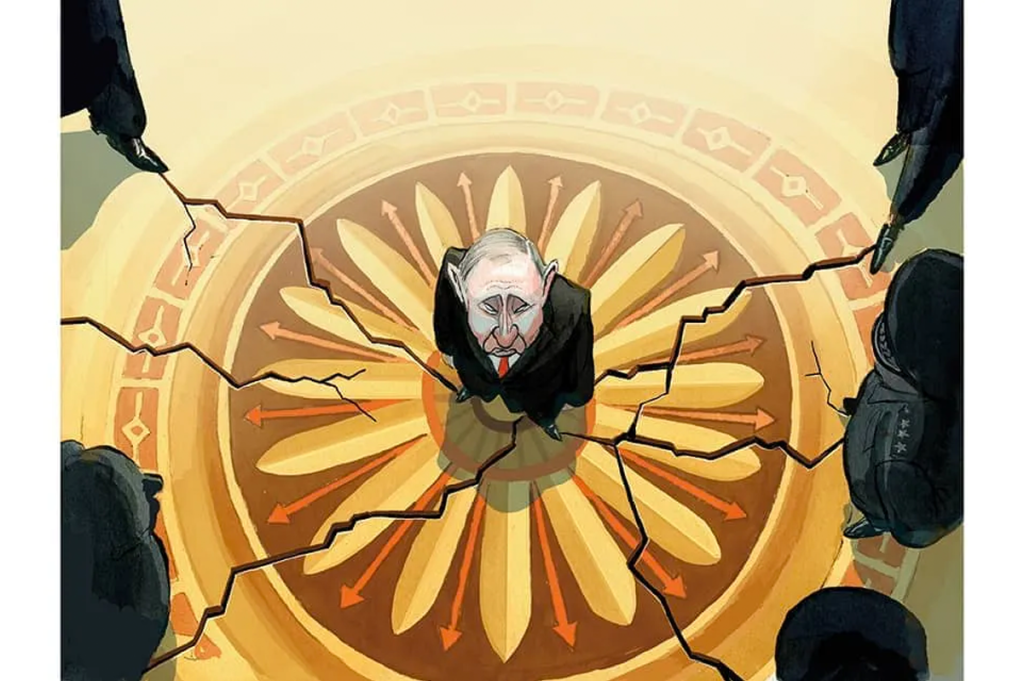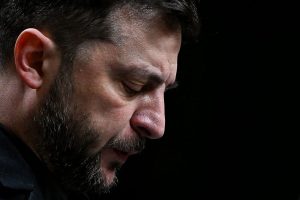The soldier with the Kalashnikov wasn’t happy. Neither were the hundreds of comrades who had chosen him as the spokesman for their angry complaints as they milled about on a train platform somewhere in Russia. “There are 500 of us, we are armed, but we haven’t been assigned to any unit,” the newly mobilized soldier complained on a video that went viral earlier this month. “We’ve been living worse than farm animals for a week… Nobody needs us, we’ve had absolutely no training.” Other soldiers, most of them masked, chipped in with more grievances. “The officers treat us like animals,” shouted one. “We’ve spent a fortune on buying food for ourselves.”
The video — and others like it — was rightly cited in the western press as evidence of the chaos that followed the “partial” mobilization announced by Vladimir Putin on September 21. But the video also revealed something much more significant about how defeat in the field is sending cracks running through the “power vertical” over which Putin presides.
Watch carefully and you can see among the ordinary forest-green camouflage army-issue uniforms several of the soldiers wearing more sophisticated kit, marked with the distinctive death’s-head badge of the Wagner private military company. The video was distributed by social media channels associated with Wagner’s founder and public face Yevgeny Prigozhin — a billionaire St. Petersburg caterer and businessman better known as Putin’s chef. In other words, this video shows not only discontented soldiers but also a private army engaged in political maneuvers.
It’s not hard to guess Prigozhin’s agenda in distributing — and possibly orchestrating — the video. The head of Russia’s largest private army is trying to undermine Russia’s beleaguered minister of defense, Sergei Shoigu. And Prigozhin is far from alone. Since Ukrainian advances near Kharkiv last month, Shoigu and his generals have come under heavy and public attack from patriotic pro-war bloggers, Wagner-affiliated media and the hawkish Chechen president Ramzan Kadyrov and even state-controlled TV. “The guilty should be punished [though] we don’t have capital punishment unfortunately,” the ultra-nationalistic TV host Vladimir Solovyov told his viewers. “They don’t even have an officer’s sense of honor because they are not shooting themselves.” Aleksey Slobedenyuk, who runs a network of Telegram channels for Prigozhin’s patriot media group, was arrested by a squad of paramilitary police, and the footage was widely broadcast by pro-Shoigu media factions.
So far, only Russia’s military command, not Putin himself, have come in for public criticism. But the obvious question is whether, or when, Putin will come into the firing line. The image of the good czar surrounded by bad advisors is as old as Russian history. But history also shows that military defeat — from the Russo-Japanese war to Afghanistan — rarely ends well for regimes whose corruption and incompetence are brutally exposed by the stress-test of war.
To date, Putin has stayed one step ahead of the rising tide of military humiliation and criticism by constantly escalating the conflict. In response to the collapse of the Kharkiv front, he announced partial mobilization and ordered hasty referendums in the occupied territories, followed by formal annexation. In response to the partial destruction of the Kerch Bridge, Putin launched more than 100 cruise missiles in two days at mostly civilian targets in more than a dozen Ukrainian cities. In July, Putin dismissively said that: “We haven’t even started [fighting] in earnest yet.” Now, in response to a rising chorus of critics urging the Kremlin to take off the kid gloves, Putin has publicly gone all-in.
But what happens if the Ukrainians keep winning? Putin can continue firing commanders (as he did after the Kerch attack). He can organize some public show trials of alleged Ukrainian “Nazis” from among the unfortunate Azov battalion prisoners taken after the battle of Mariupol. And he could, theoretically, make good on the renewed promise he made last month that he was “not bluffing” about the use of nuclear weapons — though the West has made clear that their conventional response to a nuclear attack would make it a suicide strategy for the Kremlin.
The good news, for Putin, is that twenty years of efficient repression and media control have meant that so far there has been little public resistance to the Ukraine war. On the evening of Putin’s mobilization call, I saw some 200 people gathered on the Old Arbat for a brave but futile protest that was almost instantly extinguished by riot police who outnumbered the protesters by at least two to one. Two mass exoduses — one following the outbreak of war and another after the September 21 mobilization — have seen between 500,000 and 700,000 people leave Russia for good. Among them were the bulk of the urban, politically engaged “protesting classes.” Currently, as historian Anatol Lieven recently wrote, “There is no coherent or organized force in Russian society that could bring about… revolution.”
The main challenge to Putin’s power, then, comes not from the street but from within the regime itself. Putin turned seventy on the eve of the Kerch Bridge attack. Whether rumors of his chronic illness are correct or not (CIA director William Burns said in August that he believed that Putin was “far too well”), the debate over Putin’s successor has been at the forefront of the minds of Russia’s top power-brokers for at least three years. In February 2019 the chief Kremlin ideologue Vladislav Surkov dared to publish a long essay discussing what a post-Putin Russia might look like. “Putinism” would outlast Putin himself, Surkov argued, attempting to reassure the ex-KGB men who were Putin’s closest confidants that they had nothing to fear from a transition of power. They were not reassured. It was Surkov rather than Putin who was later shown the door.
Institutionally, the Kremlin has for years been effectively an extension of the Federal Security Service, or FSB. The three most powerful men in Russia today are all current or former FSB chiefs — Putin himself, the Security Council chairman Nikolai Patrushev and the current FSB head Alexander Bortnikov. They met in the Leningrad KGB in the mid-1970s and have known and worked with each other for nearly half a century. Most other top Kremlin mandarins — for instance the Rosneft head Igor Sechin, the foreign intelligence chief Sergei Naryshkin and many more — are also drawn from that same tiny Leningrad KGB circle, leavened by a few of Putin’s old friends from his time as deputy mayor of St. Petersburg in the 1990s.
For these people, the question of who is eventually chosen to succeed Putin is much less important than who does the choosing. In 2000 Patrushev — newly appointed as head of the FSB by his former subordinate Putin who had just become president — wrote an essay comparing the FSB to Russia’s “new nobility.” And over the subsequent twenty years the FSB did indeed proceed not only to take over swaths of Russia’s state and private business but also to appoint their children as ministers and even — just like the aristocracy of czarist Russia — make dynastic marriages among themselves.
Modern Russia is not just a security state but literally a state that has been taken over by its own security services. Putin is the ultimate decision-maker and arbiter in various disputes between rival factions inside that extended FSB-connected ruling class. And insofar as a “collective Putin” exists, it’s composed of a tiny group of very closely connected, very paranoid old men whose chief goal is to preserve their wealth and power and pass it on to their children and protégés.
So when we consider whether regime change is possible in Russia, what we are really wondering is whether some outside force could ever challenge the rule, not of Putin himself, but of the extended FSB clan that currently holds ultimate political and economic power.
The army has not played a decisive political role in Russia since the aftermath of Stalin’s death in 1953, when Marshal Georgy Zhukov effectively pulled off an armed coup by arresting and soon after murdering KGB boss Lavrentiy Beria. Ever since that painful showdown between soldiers and secret police, the KGB and FSB made very sure that Russia’s military had no role in internal security — most recently by creating the Russian National Guard, headed naturally by a former KGB man, Putin’s former body-guard Viktor Zolotov. The silent majority of Russia’s elite — the mid-level bureaucrats, professionals and business-people who have been robbed of their futures and their wealth by the war — are by all accounts collectively horrified by it. Notionally these people represent significant economic and bureaucratic power. But they have no organized political voice and generally have too much to lose to risk rebellion.
So when Kadyrov, Prigozhin and the other heavily armed patriotic critics attack the failed war effort, they are not so much challenging the status quo as jockeying for advantage within it. And they succeed in advancing up the chain of command to positions of greater influence. There are other critical voices — for instance the ultranationalist philosopher Aleksandr Dugin, the Orthodox Christian fundamentalist billionaire and TV station owner Konstantin Malofeev, or the novelist-turned-Donbas rebel commander Zakhar Prilepin or former Donetsk People’s Republic defense minister Igor Strelkov — who were once in the nationalist opposition to the Kremlin but now find themselves more or less aligned with the newfound radical nationalism of the Putin regime. All have called for Putin to be more ruthless and aggressive in Ukraine. Strelkov has been a vocal critic of the Russian military’s failures from the start, and last month said that the war is already lost. Such radical nationalists are the true believers, they are armed, and they have spilled blood for their country. And they will not forgive further failure on the front lines.
If the Russian army suffers a serious collapse and the country moves into a revolutionary situation, such nationalist firebrands will be the Kremlin elite’s most dangerous foes. It is much more likely, however, that the FSB clique around Putin will respond to a rising tide of nationalist anger and frustration by becoming more nationalist and authoritarian themselves. They may make Kadyrov defense minister or appoint Prigozhin to a senior ministerial post. But Kadyrov’s and Prigozhin’s ambitions in themselves do not present a fundamental challenge to the power of the ruling FSB clan which controls serious military force, and has a stronghold on Russia’s media and politics.
The power of the extended FSB dwarfs that of any potential challengers except for one: a rising, angry people who feel cheated of victory by their corrupt leaders. That revolution is likely to be as chaotic and ugly as the one which followed Russia’s last catastrophic military defeat in 1917 — and will doubtless begin, as the previous one did, with angry soldiers on remote train platforms railing against the czar’s corrupt ministers.
This article was originally published in The Spectator’s UK magazine. Subscribe to the World edition here.

























